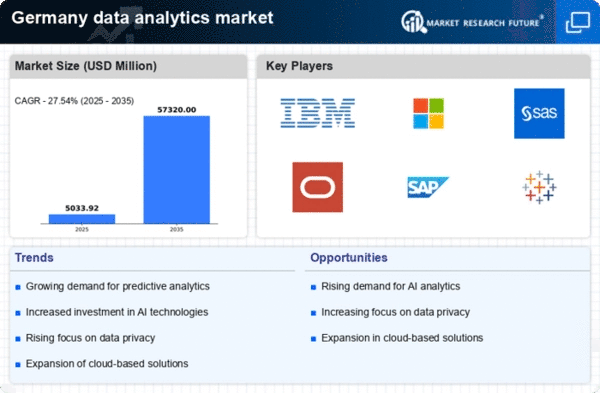Regulatory Compliance and Data Governance
In Germany, the data analytics market is significantly influenced by stringent regulatory compliance and data governance requirements. The implementation of the General Data Protection Regulation (GDPR) has compelled organizations to adopt robust data management practices. As a result, the demand for analytics solutions that ensure compliance with data protection laws is on the rise. Companies are investing in analytics tools that not only provide insights but also adhere to legal standards, thereby fostering trust among consumers. This focus on compliance is likely to drive innovation within the data analytics market, as firms seek to balance regulatory obligations with the need for effective data utilization.
Rising Investment in Big Data Technologies
The data analytics market in Germany is significantly impacted by the rising investment in big data technologies. Organizations are increasingly recognizing the potential of big data to drive innovation and improve operational efficiency. In 2025, investments in big data solutions are expected to reach €5 billion, reflecting a growing commitment to harnessing large datasets for strategic advantage. This influx of capital is likely to enhance the capabilities of analytics tools, enabling more sophisticated data processing and analysis. As companies seek to leverage big data for competitive differentiation, the data analytics market is poised for substantial growth, driven by the need for advanced analytics capabilities.
Growing Demand for Data-Driven Decision Making
The data analytics market in Germany experiences a notable surge in demand as organizations increasingly recognize the value of data-driven decision making. This trend is evidenced by a reported 30% increase in investments in analytics tools and platforms over the past year. Companies across various sectors, including finance, healthcare, and retail, are leveraging data analytics to enhance operational efficiency and customer engagement. The emphasis on data-driven strategies is reshaping business models, leading to a more competitive landscape. As organizations strive to remain agile and responsive to market changes, the data analytics market is poised for continued growth, driven by the necessity for actionable insights and informed decision-making processes.
Advancements in Data Visualization Technologies
The data analytics market in Germany is witnessing a transformation due to advancements in data visualization technologies. Enhanced visualization tools enable organizations to present complex data in a more comprehensible manner, facilitating better insights and decision-making. The market for data visualization is projected to grow by 25% annually, reflecting the increasing importance of intuitive data representation. As businesses strive to communicate insights effectively, the demand for sophisticated visualization solutions is likely to rise. This trend not only enhances the usability of analytics but also drives the overall growth of the data analytics market, as organizations seek to empower stakeholders with clear and actionable information.
Increased Focus on Customer Experience Enhancement
The data analytics market in Germany is experiencing a shift towards enhancing customer experience through data-driven insights. Organizations are increasingly utilizing analytics to understand customer behavior and preferences, leading to more personalized offerings. This focus on customer-centric strategies is reflected in a 20% increase in the adoption of customer analytics tools over the past year. Companies are leveraging data to optimize marketing campaigns, improve product development, and enhance service delivery. As the emphasis on customer experience continues to grow, the data analytics market is likely to expand, driven by the need for organizations to remain competitive in a rapidly evolving marketplace.
















